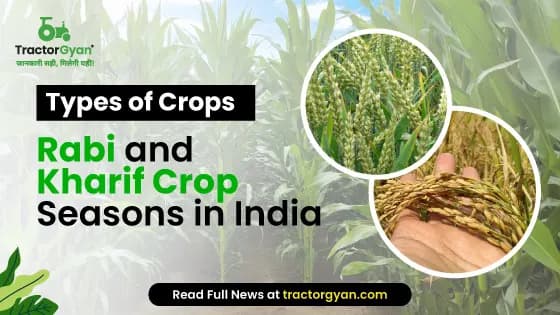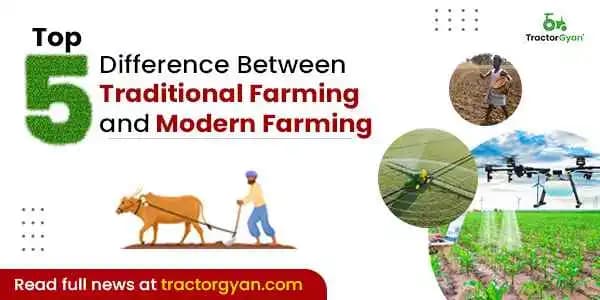Organic Farming: How is it different from natural farming
Table of Content
As we become increasingly aware of the impact of our choices on the environment, organic farming has gained immense popularity. It is a sustainable and eco-friendly approach to agriculture that emphasizes using natural methods to cultivate crops and raise livestock. This blog will explore organic kheti examples, the advantages and disadvantages of organic farming in India, and organic farming methods.
What is Organic Farming?

Organic farming is an agricultural system that eliminates or significantly reduces the use of synthetic chemicals, genetically modified organisms (GMOs), and other artificial additives. Instead, Organic cultivation relies on natural techniques and processes to ensure healthy crop growth and livestock care.
The importance of organic farming lies in its prioritization of soil health, biodiversity, and ecosystem preservation while producing high-quality, chemical-free food.
Types of Organic Farming in India

Let's learn about the different types of organic farming in India and the examples of organic farming.
1. Crop-Based Organic Farming: One of the organic kheti examples is crop-based. In this approach, farmers focus on growing crops using organic plantation methods. They use natural fertilizers like compost and manure, practice crop rotation to enhance soil fertility, and employ biological pest control measures such as beneficial insects.
2. Livestock-Based Organic Farming: This type of organic agriculture emphasizes raising animals in an environmentally friendly and humane manner. Livestock are provided with organic feed, and access to open pasture, and are not treated with growth hormones or antibiotics.
3. Mixed Organic Farming: Many organic farms employ both crop and livestock-based methods, creating a balanced and sustainable system. Crop residues and livestock manure contribute to a closed-loop nutrient cycle, enriching the soil and reducing waste.
4. Traditional Farming Practices: In these organic farming examples many Indian farmers follow age-old practices that align with organic principles, such as using cow dung and organic manure for soil enrichment, crop rotation, and pest control through natural means.
5. Zero Budget Natural Farming (ZBNF): ZBNF, popularized by Subhash Palekar, encourages minimal external inputs and relies on natural resources and farm-sourced materials. It emphasizes the use of locally available resources and indigenous seeds.
6. Organic Horticulture: India is a major producer of fruits and vegetables, and organic horticulture has gained traction. This organic farming method focuses on organic orchards and gardens, producing chemical-free and healthier produce.
Advantages of Organic Farming

Environmental Benefits:
Organic Farming reduces chemical usage, which helps preserve soil quality and prevents water contamination.
Enhanced biodiversity and wildlife habitat, as organic farms promote the existence of various species. Carbon sequestration through healthier soil management practices.
Health Benefits:
Organic foods are free from synthetic pesticides, herbicides, and GMOs, reducing health risks associated with chemical residues.
Higher nutritional value in organic produce due to better soil quality.
Taste and Quality:
Organic produce is often considered to have superior taste and quality due to the absence of chemical additives.
Sustainability:
Organic kheti practices help to maintain long-term soil fertility and overall ecosystem health.
The Importance of Organic Farming is that it reduces reliance on fossil fuels as organic farms typically use less energy-intensive methods.
Support for Local Economies:
Many organic farms are smaller and local, supporting rural communities and providing fresh, seasonal produce.
These are advantages of organic farming, proving that it pays off in the long run. We should raise awareness to make organic farming popular in India.
Disadvantages of Organic Farming

Lower Yields:
Organic farming can result in lower crop yields compared to conventional farming due to the reduced use of synthetic fertilizers and pesticides.
Higher Costs:
Organic kheti often requires more labor and expensive organic inputs, making it more costly for both farmers and consumers.
Market Price Fluctuations:
Organic produce can be more expensive, and price fluctuations can influence the market.
Pest and Disease Management:
Organic Farming methods for pest and disease control can be less effective, leading to potential crop losses.
Transition Period:
Converting a conventional farm to organic may take several years and can be financially challenging.
However, the disadvantages of organic farming aren't at a loss. Even with its downsides, there are good parts that could make it a good option for farmers. Think about all these things to see if organic farming is the right way for you.
Organic Farming Methods
Organic farming in India encompasses a variety of methods and practices that prioritize sustainability, soil health, and natural processes. These organic farming methods are often rooted in traditional agricultural practices and adapted to the specific needs and conditions of Indian agriculture. Here, we'll elaborate on some key organic agriculture methods practiced in India:
Zero Budget Natural Farming (ZBNF):
1. Jeevamrutha and Bijamrutha: These are essential components of ZBNF. Jeevamrutha is a fermented microbial culture made from cow dung, cow urine, jaggery, and pulses. Bijamrutha is made from seeds and cow dung. These are used as natural fertilizers to enrich the soil.
2. Mulching: Applying crop residues as mulch helps conserve soil moisture, suppress weeds, and improve soil structure.
3. Crop Rotation: Crop rotation is practiced to prevent the buildup of pests and diseases in the soil.
Organic Manure and Compost:
Traditional organic manures like cow dung, vermicompost, and poultry litter are widely used in Indian organic agriculture. These organic sources improve soil fertility and provide essential nutrients to crops.
Vermicomposting, in particular, is gaining popularity as it involves earthworms breaking down organic matter into rich, nutrient-laden compost.
Biofertilizers and Microbial Inoculants:
Biofertilizers, such as rhizobium for legumes and mycorrhizal fungi, are used to enhance nutrient availability to plants in organic cultivation.
Microbial inoculants like Trichoderma and Pseudomonas are employed in organic plantations to protect plants from diseases and promote growth.
Crop Diversity and Polyculture:
Indian organic farms often practice diverse cropping systems and polyculture. It reduces the risk of pests and diseases, enhances soil fertility, and promotes biodiversity.
Mixed cropping, intercropping, and agroforestry systems are common organic farming methods used to maximize land use and minimize environmental impact.
Natural Pest and Disease Management:
Indian organic farmers employ various methods for pest and disease control, including the use of neem-based pesticides, biopesticides, and biological control agents like ladybugs and spiders.
Companion planting and trap cropping are also used to deter pests naturally.
Seed Saving and Heirloom Varieties:
Many Indian organic farmers focus on saving and preserving traditional heirloom seed varieties. These seeds are adapted to local conditions and maintain genetic diversity.
Community seed banks and initiatives encourage the exchange and conservation of traditional seeds.
Organic Livestock Integration:
Organic farming in India often involves integrating livestock into the agricultural system. Cow dung and urine are valuable inputs, and the practice of cow-based farming (Gauvansh) is gaining traction.
Organic livestock farming methods, such as raising indigenous and non-exotic breeds, emphasize humane treatment and organic feed.
Conservation Agriculture:
Conservation tillage practices, like zero tillage and minimum tillage, help reduce soil erosion and improve moisture retention in arid regions.
Organic mulch and cover cropping are essential components of conservation agriculture.
Local and Indigenous Knowledge:
Indian organic cultivation often draws on traditional and indigenous knowledge passed down through generations to make informed decisions about planting, harvesting, and pest control.
Consider the following features shared by successful organic farmers when deciding if organic farming is right for you:
-
In organic agriculture commitment to a safer food supply and environmental protection.
-
Patience and keen observation skills are required.
-
knowledge of ecological systems is important in organic plantation.
-
Good marketing skills and a desire to spend time looking for new markets are essential.
-
A readiness to share and learn from others' accomplishments and setbacks (information networks are often underdeveloped for organic farmers).
-
Flexibility and a willingness to try new ideas and practices.
Challenges of Organic Farming in Indian Agriculture
-
Awareness and Education: Many farmers lack awareness and training in organic agriculture practices, making the dissemination of knowledge a critical challenge.
-
Transition Period: Shifting from conventional to organic agriculture can be financially challenging for farmers due to reduced initial yields and the time required for certification.
-
Certification Process: Obtaining organic certification can be a bureaucratic and time-consuming process for farmers, particularly smallholders.
-
Market Access: Organic produce often faces challenges in distribution and market access, as there is a need for organized supply chains and awareness among consumers.
-
Pests and Diseases: Organic pest and disease management can be more labor-intensive and may require more expertise.
Difference Between Organic Farming and Natural Farming
Here's a table highlighting the differences between organic and natural farming based on key factors. This table can help clarify the distinctions between these two sustainable farming approaches!
| Basis of Difference | Organic Farming | Natural Farming |
| Definition | A farming method that relies on organic inputs like compost, manure, and bio-pesticides. | A zero-input farming strategy that emphasizes ecosystems and cycles. |
| Use of Fertilizers | Uses only organic fertilizers. | No fertilizers are used at all; it relies on natural soil fertility. |
| Use of Pesticides | Employs organic or bio-pesticides made from natural materials. | Avoids all pesticides, relying on ecosystems to manage pests. |
| External Inputs | Requires external organic inputs like manure, compost, and seeds certified as organic. | Does not depend on external inputs; uses indigenous seeds and on-farm resources. |
| Soil Fertility Management | Improved by composting, green manures, and crop rotation. | Organically maintained via mulching, crop diversification, and soil microbes. |
| Certifications | Needs certification for organic compliance. | Does not require certification; it's a self-sustaining approach. |
| Cost of Farming | Cost of organic farming is relatively higher due to the cost of organic inputs and certification. | Cost of natural farming is lower as it eliminates dependence on market-bought inputs. |
| Focus Area | Balances productivity with sustainability. | Focuses entirely on ecological harmony and sustainability. |
| Examples of Practices | Vermicomposting, organic mulching, organic pest control. | Zero Budget Natural Farming (ZBNF), use of cow dung. |
| Market Appeal | Appeals to consumers looking for certified organic products. | Appeals to those supporting traditional, eco-centric farming. |
Conclusion
In conclusion, organic farming in India represents a holistic and sustainable approach that resonates with today's growing environmental awareness. With practices deeply rooted in tradition and a fusion of modern agricultural science, Indian farmers nurture the land through methods like Zero Budget Natural Farming, organic manure, and biofertilizers. These benefits of organic farming prioritize environmental benefits, health, and local economic support, making it a promising choice.
However, challenges such as limited awareness and bureaucratic certification processes must be overcome. Successful organic farming in India demands patience, ecological knowledge, and a commitment to safer food production and environmental preservation. By embracing flexibility and sharing knowledge, Indian farmers can ensure a thriving future for organic agriculture, fostering a healthier environment and more prosperous communities. Supporting organic farming in India means endorsing a conscientious and sustainable path toward safer food and a greener planet.
Category
Read More Blogs
Every Solis Yanmar tractor is the first choice of India's progressive farmers because they are designed in a way that empowers farmers instantly, provides advanced technology, and uplifts their operations with high-end work capabilities like advanced hydraulics and powerful PTO.
Tractors offered in...
In a world that heavily relies on agriculture for sustenance and economic growth, advancements in farming technologies play a crucial role. Mahindra, a renowned name in the agricultural sector, has recently launched the highly innovative Mahindra Precision Vacuum Planters. With a...
In the world of agriculture, finding an affordable and reliable tractor can be a game-changer, especially when your budget is a top priority. If you're on the lookout for second-hand tractors under 5 lakhs, you're in the right place. In this blog,...
Write Your Comment About Organic Farming: How is it different from natural farming
.webp&w=1920&q=75)
Top searching blogs about Tractors and Agriculture
30 Jul 2025
30 Jul 2025
29 Jul 2025
08 Sep 2025
03 Jul 2025
30 Jul 2025
30 Jul 2025
30 Jul 2025
29 Jul 2025
30 Jul 2025
29 Sep 2025
31 Jul 2025
30 Jul 2025
31 Jul 2025















.webp&w=3840&q=75)










.webp&w=3840&q=75)
.webp&w=3840&q=75)



























